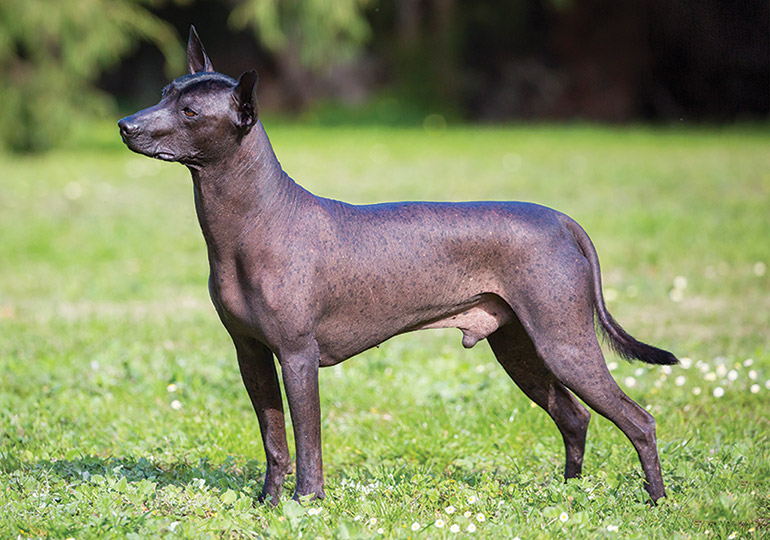Breeds
Xoloitzcuintle - (Miniature) (Intermediate) (Standard)

GROUP 7 - NON SPORTING
History
The majority of purebred dogs have been designed for a specific purpose, the Xoloitzcuintle was not; being unique in the fact that it is formed by natural selection, created and moulded by environmental adaptation, rather than selected by man. The breed is estimated to be more than 3,500 years old and is amongst the world’s most ancient breeds.
Many thoughts are that the early Xolos resulted from a hairless mutation of native Indian breeds. The Xolo had to be tough and adaptable and the mutation may have given the Hairless dogs a big advantage in surviving, making it versatile with strength, hunting prowess, guarding instinct and a tractable character.
Appearance
To fulfil such a range of purposes, the Xoloitzcuintle obviously possessed incredible survival instinct; furthermore, it had to be efficiently constructed for power, endurance and agility, to fill such a wide range of demands. The breed had to be moderate in every way. Extremes of type or structure always come at a price and the Xolo could not afford to sacrifice any skills to survive.
The breed is a moderate, natural dog, extreme variations of temperament, size, proportion, balance or angulation would have also been counter-productive to the maximum functionality of the breed.
The Xolos outline is rectangular; it is slightly longer than tall, in a ratio of 10:9. This length of body is ideal for smooth, efficient trotting, with maximum reach and drive. It will not result in a rangy appearance, as long as the dog is properly constructed, with well laid-back shoulders and well-angulated hindquarters, a short, strong loin area and sufficient depth of chest.
Coated or Hairless, the Xolo evolved as a naturally low maintenance breed. They should never require complicated trimming, shaving or skin care to appear typical or well-groomed. The breed comes in three sizes, Miniature, Intermediate and Standard and two types, Hairless and Coated.
Temperament
The Xoloitzcuintle is quiet and adaptive in the home when he feels safe, has all the attention and a lot of personal interaction.
The breed is wary of strangers and becomes very protective of his home and territory. The key to a good Xoloitzcuintle is the hard work you put into them, by taking them to as many places and experiences as you can (this excludes the show ring). All this frequent social training will build the Xolo into a confident and stable dog; the more work you put in, the more rewards you will gain with his character and temperament.
The Xoloitzcuintle will always be primitive in behaviour, and they excel well with structure and consistency in life. Reactions are instinctive and lightning fast reflexes often catch us out. It’s important that owners harness these fast reflexes, and his sensitivity, by utilising the breed’s extreme intelligence to mould the Xoloitzcuintle into his eventual character with positive reward based training. Harsh discipline should never be used on a Xoloitzcuintle.
Health
The Xoloitzcuintle is considered a hardy dog with no particular health problems and no breed specific genetic issues. As with most hairless dogs missing teeth are prevalent, due to the gene for hairlessness, but this does not alter them being able to eat like any other canine.
The skin of the Xoloitzcuintle is tough, and although protective, Xoloitzcuintle require regular attention to the skin with baths, loofahs and lotions applied to keep the skin healthy. Some Xoloitzcuintle’s are born with hair (Coated Xolos) which have short hair and no undercoat. The Xolos ears are large and open to the elements, so they must be cleaned weekly to prevent dirt build up. It is also advisable to clip their nails each week, as they grow at an alarming rate, and also to prevent growth of any length, which may off balance the toe and lead to gait problems.
The Xoloitzcuintle needs to be closely monitored when anesthetised, due to their limited ability to regulate body temperature freely (Hairless).
Suitability
Xoloitzcuintle are suited to experienced people with primitive breeds and families with older children. They do best as being part of the family and do not do well in kennel situations, as constant stimulation and interaction are a must. A firm and direct approach is needed in their training.
Words and image by Jacqi Dinis
In Conclusion
Now you know a little about the Xoloitzcuintle, you may think that this is the dog for you. Before you make a decision, please make contact with the breed club or your State controlling body for purebred dogs. They will be able to give you information about available puppies and also suggest dog shows where you can see the breed and speak to breeders. In this way you will gain a better perspective of the Xoloitzcuintle and its needs, and whether this breed would suit your lifestyle.


